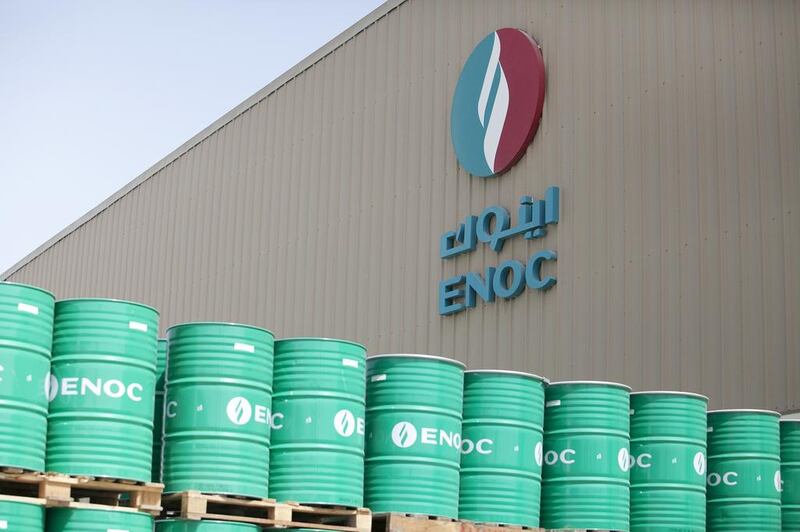Emirates National Oil Company (Enoc) said it sold record volumes of petroleum products last year, driven mainly by its trading arm.
The Dubai government-owned integrated oil company, which produces about 100,000 barrels of crude per day from an oilfield in offshore Turkmenistan and owns and operates a 140,000 bpd refinery at Jebel Ali as well as more than 120 retail outlets throughout the UAE, said it had volume sales totalling 245 million barrels oil equivalent last year.
Petri Pentti, Enoc’s chief financial officer, said that while about 45 million to 50 million barrels of sales were accounted for by its physical operations, the bulk of its sales volume – nearly 200 million barrels of oil equivalent – was accounted for by its trading arm, which operates out of offices in Dubai, Singapore and London, and trades derivatives, such as “paper barrels” and oil futures, as well as physical oil.
“Trading is a significant part overall but it comes with very thin margins,” Mr Pentti said.
The company is owned by the Investment Corporation of Dubai, the emirate’s sovereign wealth fund, and does not report full financial results publicly, but Mr Pentti said that its annual review, due out next month, will show that revenue last year was down by about 10 per cent from US$15 billion in 2015, which was already lower by about 27 per cent on the previous year.
“What’s important is the volume growth figure, which has been 9 per cent a year on a five-year rolling average,” said Mr Pentti, adding that the revenue decline adjusted for volume means Enoc’s performance is well ahead of peer companies.
The trading arm was originally set up 16 years ago to help Dubai meets its fuel needs, which still requires imported petrol and other fuels, as well as to minimise the substantial cost of subsidies.
Mr Pentti said that eliminating retail fuel subsidies in the UAE 18 months ago has lifted a severe drag from the company’s profitability and allowed it to move on to a growth strategy. The move to unsubsidised fuel prices in August 2015 coincided with Enoc’s success in buying out minority shareholders in Dragon Oil, which is the subsidiary that operates the Cheleken oil and gas area in Turkmenistan.
Since those two developments, Enoc has embarked on a strategy of expansion. In autumn last year, it tapped French engineering firm Technip to lead the planned $1bn expansion of its Jebel Ali plant to a capacity of 210,000 bpd by 2020.
It is also adding 54 retail outlets to its existing portfolio of more than 120 stores, which includes non-fuel retailing and a new network of a 27 retail stations on Saudi Arabian link roads.
“We had been suffering from the fuel subsidies and clearly there is a much healthier situation now,” said Mr Pentti, without disclosing last year’s profit numbers.
Last month, Enoc’s management consolidated its position over Dragon Oil, installing Saif Al Falasi, Enoc’s group chief executive, as chief executive of Dragon Oil and naming Sheikh Hamdan bin Rashid, Deputy Ruler of Dubai, Minister of Finance and chairman of Enoc Group, as chairman.
Mr Al Falasi has said the company is looking to expand upstream by acquiring already discovered oilfields that are at development stage, although acquisitions have yet to be announced. The company has also been expanding its financing base, with a $1.5bn syndicated bank loan in 2015 that has now been fully utilised.
Mr Pentti said Enoc is weighing other financing options, including a possible sukuk, or Islamic-compliant bond, issue.
“The funding strategy has multiple elements and one possibility is a sukuk, which seems to be a very well-supported option in the GCC region,” he said, adding that parent company ICD made its capital markets debut two years ago with a successful $1bn sukuk programme.
amcauley@thenational.ae





